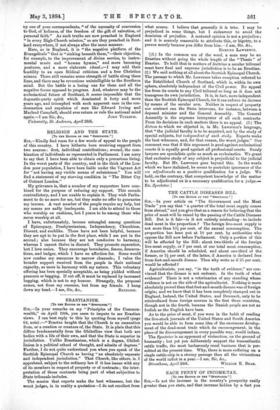• ERASTIANISM. [To TRH EDITOR ON TRH " 8PsorAToz.")
your remarks on my "Principles of the Common- wealth," on April 19th, you seem to impute to me Erastian views. I can best reply to this by quoting from myself (page 64, note) :—"Erastus taught that the Church is an emanation from, or a creation or creature of, the State. It is plain that this differs fundamentally from the Ghibelline view that both are bodies with a life of their own, and that the State is superior in jurisdiction. Unlike Erastianism, which is a dogma, Ghibel- linism is a political school of thought, and admits of degrees." Further, I do not quite understand you when you speak of the Scottish Episcopal Church as having "an absolutely separate and independent jurisdiction." That Church, like others, is, I apprehend, subject to the ordinary law if it has issues with any of its members in respect of property or of contracts ; the inter- pretation of those contracts being part of what subjection to State tribunals includes.
The maxim that experts make the beet witnesses, but the worst judges, -is in reality a quotation—I do not recollect from what source. I believe that generally it is trhe. I may be prejudiced in some things, but I endeavour to avoid the dominion of prejudice. A matured opinion is not a prejudice ; and it is scarcely reasonable to attribute this, or bigotry, to a person merely because you differ from him.—I am, Sir, &c., EDMUND LAWB.ENCE.
[(1.) In the common use of the word, a man may be an Erastian without going the whole length of the " Thesis " of Endue. To hold that in matters of doctrine a secular tribunal must have final and supreme jurisdiction is to be an Erastian. (2.) We said nothing at all about the Scottish Episcopal Church. The passage to which Mr. Lawrence takes exception referred to the Established Church of Scotland, which is, within its own sphere, absolutely independent of the Civil power. No appeal lies from its courts to any Civil tribunal so long as it does not transgress its own jurisdiction. It is, in fact, more independent than the Scottish Episcopal Chinch, for it can enforce its decrees by means of the secular arm. Neither in respect of property nor contract can the State intervene, for instance, between a deposed minister and the General Assembly. The General Assembly is the supreme interpreter of all such contracts. From its decisions in such matters there is no appeal. (3.) The dictum to which we objected is, in Mr. Lawrence's language, that "the judicial faculty is to be acquired, not by the study of special subjects, but independent of such study. Experts make the best witnesses, and, for that reason, the worst judges." Our comment was that if this argument is good against ecclesiastical courts it is equally good against all professionalSourts. Surely lawyers are specialists quite as much as ecclesiastics. We grant that exclusive study of any subject is prejudicial to the judicial faculty. But Mr. Lawrence goes beyond this. In the words which we have italicised, he seems to postulate ignorance of the res adjudicanda as a positive qualification for a judge. We hold, on the contrary, that competent knowledge of the matter to be adjudicated on is a necessary qualification for a judge.• ED. Spectator.]


































 Previous page
Previous page